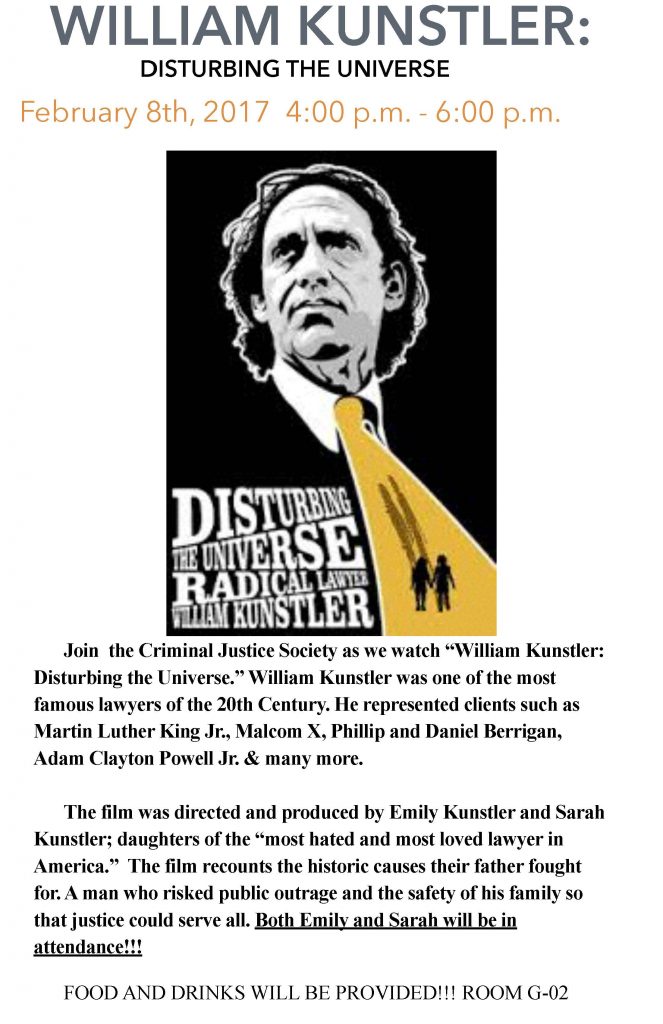Criminal Justice Society at Pace hosted a Spring 2014 event dedicated to discussing solitary confinement. The event was well attended leaving the attendees with a lot to think about. Our first year students who attended this event shared some of their thoughts with us below.
POST WRITTEN BY: Alexandria Capaccio (’16), Ashley Kersting (’16), and Jake B. Sher (’16)
Loneliness is very much like pain. It has evolved over time to change our behavior so that we reconnect with others, which is necessary for our survival. … Being ignored is so painful it’s better to be treated badly by someone than ignored….
John Cacioppo, Social Neuroscientist, City of Chicago
These words from National Geographic’s “Lonely Prisoners” Program served as the opening gambit for The Pace Criminal Justice Society’s discussion on solitary confinement, entitled Thinking Outside the Box. The panel brought attention to the serious issues of solitary confinement in prisons. Pace’s Professor Michael B. Mushlin engaged three panelists: Sarah Kerr, Staff Attorney in the Prisoners’ Rights Project at The Legal Aid Society; Five Mualimm-ak, a solitary confinement victim and prison reform activist; and Leah Gitter, whose family member with mental illness has been held in solitary confinement at a number of prisons including Rikers Island. The panelists drove home the central issue that the current method of solitary confinement is not working; it is both inhumane and counter-productive.
Over 80,000 prisoners in this country are living 23 hour days alone in their cells deprived of any meaningful stimulation. The panelists referred to these extreme conditions as “torture.” A former inmate, Five changed his first name to memorialize the five of his twelve years of incarceration that he spent in solitary confinement. Five was placed in solitary confinement not as a punishment for the crime he committed or any violent behavior, but instead for minor disciplinary violations he allegedly committed while incarcerated.
Five explained that even minor disciplinary violations, such as possessing too many pencils or t-shirts, frequently subject a prisoner to an indefinite period of time in the “box.” There are no governing time limitations or regulations on the time spent in the “box,” instead the decision about the duration of this type of confinement is left to the discretion of prison officials.
Collectively, the panel agreed with the goal of the prison system to protect, reform and rehabilitate inmates, but took the position that subjecting mentally ill prisoners to solitary confinement does not further those goals. Instead, solitary confinement is unnecessary and inflicts further psychological damage on inmates.
The panelists stressed that contrary to the common belief that solitary confinement is used to protect other prisoners from other dangerous, violent, or gang affiliated members, the majority of prisoners spending time in the “box” are there due to the prison’s inability to deal with the inmates’ mental and physical disabilities. These harsh living conditions remove inmates from human sensory stimulation and contact; and as such, they are directly attributable to the high recidivism rates of inmates subjected to such confinement.
The public’s attention on issues of solitary confinement tends to focus on the question of whether prisoners are serving time because they are guilty. This focus, however, obfuscates the actual problem that solitary confinement poses to the liberty of prisoners and law-abiding citizens alike. In the seminal case on the issue, the Supreme Court held: “Prison disciplinary proceedings are not part of a criminal prosecution, and the full panoply of rights due a defendant in such proceedings does not apply.” Wolff v. McDonnell, 418 U.S. 539, 556 (1974). New York’s Appellate Division has held Wolff to mean that inmates charged with violating disciplinary hearings are entitled to minimal due process protections that do not include the right to counsel or to confront or cross-examine witnesses. Laureano v. Kuhlmann, 550 N.E.2d 437, 439 (N.Y. 1990) (emphasis added). Courts are divided as to the evidentiary standard used for disciplinary proceedings between “some evidence” and “substantial evidence” – both standards well below the preponderance of the evidence standard used in civil litigation (to say nothing of “beyond a reasonable doubt”).
American citizens who retain their “full panoply of rights” would never tolerate the loose evidentiary standard that is used when determining whether an inmate should be placed in solitary confinement.
Perhaps a better way of considering the problem revolves around Professor Mushlin’s haunting statement that some former victims of solitary confinement may be – or are – our neighbors; they are either released after their prison terms have ended, as Five was, or worse, they are exonerated innocents. They are our fellow citizens’ cousins, friends, spouses, or parents. If we would not tolerate the trampling of our own rights under the Fourteenth and Fifth Amendments, we should not tolerate theirs, either; the slope is slippery, and we are much closer to their plight than we would prefer to believe.


